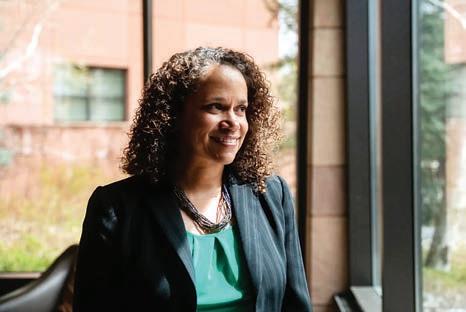
5 minute read
Colorado repeals law limiting municipal internet
BY TAMARA CHUANG THE COLORADO SUN
By the time Longmont voters rejected a proposal in November 2009 that would have let the city’s electric utility build faster internet service, Sandi Seader wasn’t surprised the measure had failed.
It was the erce opposition that shocked her. e opposition, led by the cable TV industry, had raised more than $200,000 to ght the burgeoning threat to their business.
“We weren’t expecting anyone to campaign against it, which is totally naive now that I think about it,” said Seader, a former lobbyist and now assistant city manager. “And, of course, municipalities can’t advocate for or against their own ballot issues. We were hamstrung. It had to be a private citizen group that would come out and support the bill, but that wasn’t quite realized yet.”
While many U.S. households had access to broadband in 2009, the much faster gigabit- ber service Longmont wanted to build was practically unheard of. ere would be many more battles between Colorado’s municipalities and the industry. at’s because a 2005 state law required every local government to ask voters for permission to build. When Longmont asked in 2009, the measure failed by 12%.
Senate Bill 152 was promoted by the cable industry as a way to prevent wasting taxpayer money on infrastructure projects, like municipal internet. Towns, however, could still pursue it, as long as no one else offered “advanced service,” or internet speeds in excess of 256 kilobits per second, according to the law. But this was 2009, when about 63% of Americans had broadband at home and speeds averaged 7-8 megabits per second, or 30 times faster than 256k. Gigabit service was about 4,000 times faster, though largely unavailable from telecom providers.
Longmont asked voters again in 2011. But this time, it added language like “without increasing taxes” and mentioned the city-owned ber network built in the ’90s. A citizen’s group rallied and the e ort bene ted from the publicity of Google Fiber. e measure passed with 61% in favor.
Two years later, the city of Centennial put the question to voters and it, too, passed. Montrose, Boulder, Yuma County and other areas found success the following year. As of November, 122 towns and about 40 counties had opted out of Senate Bill 152, according to the Colorado Municipal League. e only failure? Longmont, during its rst attempt in 2009.
Referendum requirement ends
Last month, Colorado repealed the referendum requirement and nixed the kilobits reference with the passage of Senate Bill 183. Support came from all sides, including the cable industry, which was neutral on the legislation. But there was another reason for the timing: federal broadband funding.
e Colorado Broadband O ce wasn’t sure if communities that hadn’t opted out would be eligible for a piece of the up to $1 billion in federal broadband funds Colorado could receive. Now, there’s no question.
“Removing this barrier means cities and counties that had not opted out no longer have to overcome this massive task,” said Brandy Reitter, executive director of the Colorado Broadband O ce.
Many other states adopted broadband restrictions similar to Colorado’s, as cable and telecom providers funded campaigns, recalled Kevin Bommer, executive director for the Colorado Municipal League, which represents 270 cities and towns in the state.
Bommer said the telecom industry was hoping to avoid “want what they thought was unfair competition from government-owned or operated telecom or even television,” he said. “When Senate Bill 152 was introduced, it was a straight-up no local government can do this period, a pre-emption. Our lobbyist (Geo Wilson) was able to slow it down enough that it was in doubt and the proponents cut a deal. And the deal was that municipal ownership and operation of telecom and broadband was illegal — unless voters gave permission.”
After Longmont received the blessing of its citizens, the city won approval again two years later for a $45.3 million bond to build the citywide service. Construction began in 2014 and the rst customers for the new NextLight service signed up later that year. In 2016, the city was named the third fastest service in America by PC Magazine, which mentioned that Comcast covered 93% of the town. e following year, Longmont ranked rst and the publication realized it was NextLight’s edge that made the di erence. Longmont has stayed near the top ever since.
And the bond is on track to be paid o by 2029 and “We’ll be, I hate to say, ush with cash but (that means) we’ll be spinning o a fair bit of cash to put back into and reinvest in the community,” said Valerie Dodd, NextLight’s executive director.
NextLight’s gigabit service is available to 92% of the city’s households (“We’re in continual build mode because the city is expanding and growing at what is roughly 1% a year,” Dodd said). e gap includes apartments and mobile home parks where the city needs the owner’s permission to install the service. Of businesses and residents who are able to sign up for service, 60% have.
“We have absolutely leveraged our electric utility and couldn’t have done it without them,” Dodd said. “I always like to remind people that our measuring stick is not pro tability. Our measuring stick is connectivity for everyone. We are not picking and choosing neighborhoods or apartment complexes. It’s truly access for all.”
Passing Senate Bill 152, however, didn’t mean a town was getting ber internet anytime soon, if ever. It just gave o cials the right to start the conversation.
Cities take di erent approaches
While some cities, like Longmont, issued bonds to build their system, others, like Centennial, built a berinternet backbone and then leased access to private internet providers to o er gigabit service to individual households.

Other cities opted out and decided to let private companies handle it altogether. Lakewood, which opted out in 2019, owns some ber lines that it uses to manage tra c signals or is used by the school district. In November, Lakewood o cials announced that Google Fiber would build ber-to-the-home service to as many households as possible. A wireless version will be o ered to apartments and condos.
e city isn’t building the infrastructure. Google is.
Partnering with a private internet provider was always the focus, city spokesman Dan Stoutamire said.
e rst customers are expected to be online by early 2024.
“ e city council initiated the ballot measure in order to position the city to be able to best take advantage of opportunities that might arise,” Stoutamire said in an email. “Generally, Lakewood is considered to have good connectivity, though residents have regularly expressed a desire for alternative providers that might bring increased speeds and/or lower costs.” e Colorado Sun co-owns Colorado Community Media as a partner in the Colorado News Conservancy. It is a reader-supported news organization dedicated to covering the people, places and policies that matter in Colorado.
Meanwhile, Westminster, which actually never opted out of Senate Bill 152, partnered with Google Fiber in February.
Construction is scheduled to begin later this year, city spokesman Andy Le said.
With each passing year, more cities and towns voted by a large majority to opt out. ere was a cost to taxpayers: paying to put the question on the ballot. e Colorado Broadband O ce estimated the cost for a ballot measure was between $5,000 and $40,000, depending on the size of the municipality.

Read more, sign up for free newsletters and subscribe at coloradosun. com.
Let’s talk steaks. Steaks that are tender, juicy, and full of flavor. Perfectly aged, hand-trimmed, one-of-a-kind steaks that are GUARANTEED to be perfect, every single time. These aren’t just steaks. These are Omaha Steaks.











